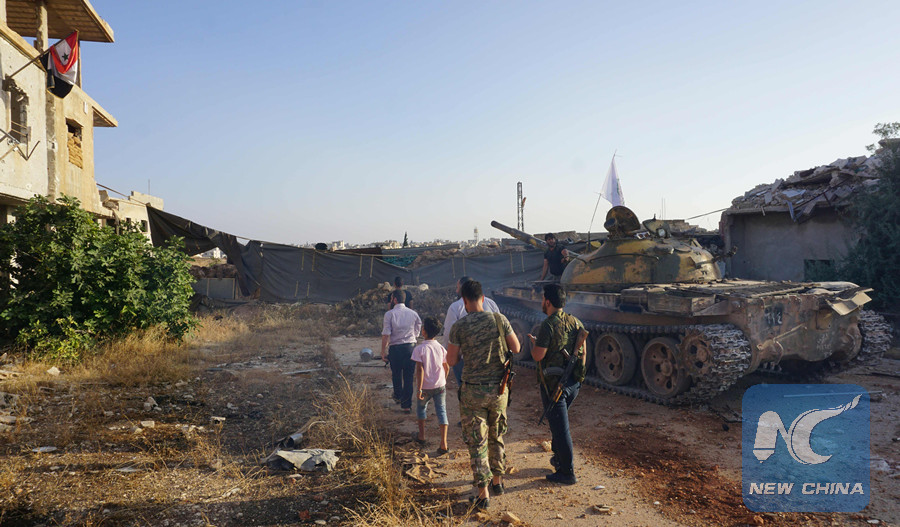
A picture taken on July 19, 2018 shows rebel fighters and civilians in the town of Fuaa in the northwestern Syrian province of Idlib. (AFP photo)
ISTANBUL, July 20 (Xinhua) -- After largely eliminating the terrorist threat in southern Syria, the Syrian army may target rebels in Idlib next, exposing Turkey to a security risk as well as a huge flock of refugees, analysts said.
Turkish troops stationed in Idlib to monitor cessation of hostilities would risk getting caught between two fires in case Idlib is attacked, Cahit Armagan Dilek, a former staff officer, told Xinhua.
Turkey has established 12 observation posts in the Idlib province based on a deal with Russia and Iran last year to prevent armed confrontation between the Syrian forces and the rebels.
Idlib, which is on Turkey's southern border, is the last remaining stronghold for rebels in Syria.
Turkey needs to dissuade the rebels from fighting the Syrian army or make them withdraw into areas under Turkish army's control near Idlib for the security of its troops there, Dilek said.
Earlier this year, the Turkish army, backed by the Free Syrian Army (FSA) militia, captured the Afrin area in northern Syria from Kurdish militia, which Ankara sees as terrorists. The Afrin area borders Idlib on the north.
The Syrian army launched last month a major offensive against rebel groups in the Daraa province in southwestern Syria and took almost complete control of the region earlier this week.
Many believe the rebels in Idlib, for whom Ankara has acted as a sort of patron during the Astana peace process jointly conducted with Moscow and Teheran, will be the next target for the Syrian government forces.
Idlib is estimated to have a population of nearly 2.5 million and in case the clashes begin, the civilians would try to flee to Turkey.
Refugees would then become the number one problem for Turkey, posing an even bigger threat than terrorism, stated Dilek who currently heads the Ankara-based 21st Century Turkey Institute.
Turkey has already hosted around 3.5 million Syrians.
Faruk Logoglu, a former senior diplomat, thinks that much of what comes next for Syria, including Idlib, will depend on any agreement Trump and Putin may have reached in their recent meeting in Helsinki.
"Any deal between the U.S. and Russia would not only mean the curtailment of Iran's presence but also result in further marginalization of Turkey's presence and influence in Syria," Logoglu told Xinhua.
Turkish President Recep Tayyip Erdogan criticized, in a phone call with his Russian counterpart Vladimir Putin last week, the offensive in Daraa, arguing that civilians were targeted.
Quoting an unidentified official from the president's office, local media reported Erdogan as saying that the essence of the Astana deal would be ruined in case Idlib is attacked.
Idlib, estimated to host around 50,000 rebels, has become a sanctuary for jihadists amid efforts to end the clashes in the civil war-torn country.
Thousands of rebels and their families from other parts of Syria were allowed to go to Idlib since end of 2016 in return for handing over their heavy weapons and the areas under their control to the Syrian forces.
Dilek does not think Erdogan's warning would work, saying "considering what happened in the other three de-escalation zones, it looks as if Idlib will also unavoidably face the same."
Idlib is one of the four de-escalation zones created by the guarantors of the Astana process to end clashes and seek political settlement in Syria.
Backed by Russia and Iran, the Syrian army has already taken control of the de-escalation zones other than Idlib, the Daraa province being one of them.
Russia's Sputnik news agency quoted Thursday Russian ambassador to Damascus, Alexander Kinshchak, as saying the Idlib issue could be settled through negotiations as it was the case in Daraa.
Noting the people in Daraa pressured the rebels to make peace with the Syrian government as they have been tired of the war, the ambassador said "the same thing may also happen in Idlib."
However, he added that all this should not be expected to happen easily and soon.
Even if Turkey manages to get the rebels to hand over Idlib to the Syrian army and withdraw to areas under Turkish control in Syria, Turkey would still be confronted with security risks, Dilek said.
Other than Afrin, Turkish troops and FSA militia also have several Syrian small towns such as al-Bab under their control in northern Syria. The Turkish army kicked out the Islamic State militants from the area in an offensive launched in 2016.
Mass arrivals of rebels in Turkish army-held areas could cause Ankara to lose its control over those areas, remarked Dilek.
He warned that Ankara may well be confronted with increasing jihadist activity in the provinces bordering the areas where the rebels would seek shelter.

